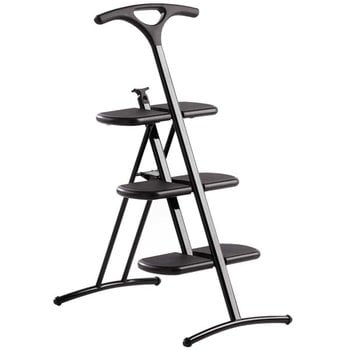Tiramisù stepladders are a functional object to every home. The folding stepladders have a slip-resistant finish. The handles offer support during use, and afterwards the ladders can mounted on the wall. The Tiramisù stepladders by Kartell are designed by Andries Van Onck in 1991.
Tiramisù step ladder, black
Kartell
Description
Tiramisù stepladders are a functional object to every home. The folding stepladders have a slip-resistant finish. The handles offer support during use, and afterwards the ladders can mounted on the wall. The Tiramisù stepladders by Kartell are designed by Andries Van Onck in 1991.
Product details (6)
- Colour
- Black
- Width
- 43 cm
- Depth
- 60 cm
- Height
- 92 cm
- Measurement details
-
Depth: 60 cm open / 7 cm closed
Height: 92 cm open / 101 cm closed - Material
- Painted steel, fibreglass reinforced polypropylene
Designer
The dutch Milan-based designer Andries van Onck (b.1928) was tought by Gerrit Tomas Rietveld before he started studying in Ulm at Hochschule fire Gestaltung. He started his career working as a designer for Olivetti in Italy and opened later his own studio in Milano where his wife Hiroko Takeda joined him. Together they designed numerous furniture, household appliances and electronic products.
Van Onck has won several prestigious awards like the Compasso d’Oro design award. He has also always been interested in the theoretical approach of design and has therefore worked as a reacher and written scientific articles and even two books.
View all productsReviews (0)
Sustainability
The Product Sustainability Framework, our criteria of sustainable design, helps you find the most sustainable products in our selection. Read below which sustainability criteria this product has met.
Working conditions & labour 9/9
-
Equal opportunities for all employees
-
Commitment to UN Global Compact, fair compensation for all employees
-
Corporate responsibility requirements defined and communicated for suppliers
-
Systematic work for improved inclusion and well-being in the workplace
-
Transparent supply chain
-
Suppliers' compliance to a code of conduct ensured
-
Direct suppliers audited and certified
-
Compliance to the UN Guiding Principles on Business and Human Rights ensured in the supply chain
-
Support for community involvement in the supply chain
Eco-friendly production 8/9
-
Fair and resource-wise water-use in production
-
No incineration or landfilling of returned items
-
No use of endangered species as materials
-
No direct environmental emissions or waste (excl. GHGs) from production
-
The sustainability of direct suppliers' production is addressed and monitored
-
Production and material sourcing that respect biodiversity, animal rights, and natural ecosystems
-
Material-efficient and ecological packaging
-
No potentially harmful chemicals used in own production
-
Positive impact on nature’s well-being through operations that regenerate natural ecosystems
Climate impact 4/8
-
Company's direct greenhouse gas emissions identified and commitment to reduction
-
Product's carbon impact identified and commitment to reduction
-
Guidance on energy- and eco-efficient use of the product
-
Contribution to climate initiatives beyond the brand’s direct operations
-
Low-carbon or compensated transportation
-
Carbon footprint of the product calculated and goals set to reduce it
-
100 % renewable energy in own production and operations
-
Carbon neutral or carbon negative product
Sustainable materials 5/6
-
Sustainable and long-lasting material choices
-
No harmful or hazardous substances
-
Responsible raw material sourcing and production
-
Materials suited for circularity: monomaterials, recyclable finishings, renewable or recycled contents etc.
-
Ecological materials: natural, biodegradable, recyclable or recycled contents
-
Outstanding materials in terms of innovativeness, responsibility, sustainability and circularity: local production or sourcing, 100 % recycled content, C2C-certification etc.
Circular design 4/5
-
High aesthetic quality promoting long-term use of the product
-
Technically durable product design and material choices
-
Design for enduring life-long quality
-
Design and support for product maintenance, repair and upgradability
-
Innovative circular design solutions: circular service system, resale platform, remanufacturing, collection of used products, etc.
Chat to us online
Please enable functional cookies to use this feature. You can change your cookie settings at any time.


